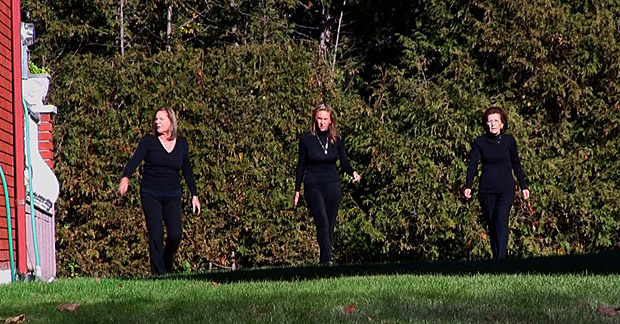MONTREAL – On Antoine Berthelet Avenue, women are left behind in three adjacent homes, each missing a member of the Rizzuto clan.

As the police investigation into Nicolo Rizzuto’s killing continues, attention is turning to who and what remains in the apparent systematic destruction of the Rizzuto clan.
Rizzuto left a widow and a house, and a $1.55-million lien on the property with which she must now contend.
The 86-year-old patriarch of the Montreal Mafia family was shot and killed Wednesday inside the luxurious home he and his wife, Libertina Manno Rizzuto, had built in the 1980s.
Rizzuto’s son, Vito, whose home is two doors down, is in a U.S. prison. His wife, Giovanna Cammalleri, is listed as the sole owner of their home. Her name is also the lone name on the 1981 sales deed.
Between the two houses, Nicolo Rizzuto’s son-in-law, Paolo Renda, is missing and believed to have been kidnapped earlier this year. He owns the home he shares with his wife, Maria Rizzuto, Vito Rizzuto’s sister.
Real-estate records for Nicolo Rizzuto’s mansion show a lien placed by the Canada Revenue Agency in 2006 to claim $1.55 million from him for unpaid income tax. The municipal assessment of the property is $1 million.
The revenue agency’s case, filed shortly after the RCMP arrested Rizzuto in Mafia probe Projet Colisee in 2006, was still pending as of Thursday, Federal Court records show. The tax claim is based on a re-assessment of Rizzuto’s suspected revenue in 1994 after an RCMP investigation at the time turned up five Swiss bank accounts that were opened by people in Rizzuto’s name.

Get daily National news
The accounts were discovered after Rizzuto returned to Canada in 1993 from Venezuela, where he was jailed for cocaine possession.
The tax claim may be based on Rizzuto’s suspected undeclared income, but the lien is on a house that the real estate records show is solely owned by Libertina Rizzuto.
The couple bought the land together in 1981, but her husband sold his share to her in 1983. In fact, her husband’s previous income-tax declarations, filed by the federal revenue agency in its case against him, show that the family Jaguar and Mercedes at the time also belonged to his wife.
"It’s very common in the Mafia world to not own property," Antonio Nicaso, a Toronto-based author of several books on organized crime, said in an interview.
Ever since Canada passed legislation making it possible to seize the proceeds of crime, there has been a tendency for property to become listed under the names of wives and daughters, he said.
Nicolo Rizzuto’s grandson, Nick Rizzuto Jr., was gunned down in late December.
Full ownership of his home in Laval, near Montreal, was transferred to his widow, Eleonora Ragusa, in July, real-estate records show. The couple bought the house together in 1997.
All four women are major stakeholders in either the family funeral home business, Complexe funeraire Loreto, or the company Construction Renda Inc., or both.
Nicolo Rizzuto married into the mob when he married Libertina Manno, the daughter of a Mafia boss in Cattolica Eraclea in Sicily nearly 65 years ago.
"There was always love and respect between Nicolo and Libertina," Nicaso said, adding he has interviewed people who know the couple well. "Usually the mobsters have lovers, but that was never the case with Nicolo."
Nicaso described Libertina Rizzuto as a strong-willed person who unlike some of the wives did not hide in the shadows.
"She was not the typical wife of a mobster," he said. "Sometimes mobsters choose to have a wife to stay at home, raise the children, keep their mouth shut and respect the rule of the man. But that was not the case with Libertina."
She demonstrated her strength when she was arrested in Switzerland in the 1990s, trying to close what the Canada Revenue Agency alleges was one of five bank accounts opened for the benefit of her husband – though not in his name – and containing more than $5 million. She was later released with no charges being filed.
"She was able to stand for her convictions and demonstrate that the money belonged to the family," Nicaso said. "The way she solved that issue demonstrated that she never panicked."







Comments
Want to discuss? Please read our Commenting Policy first.